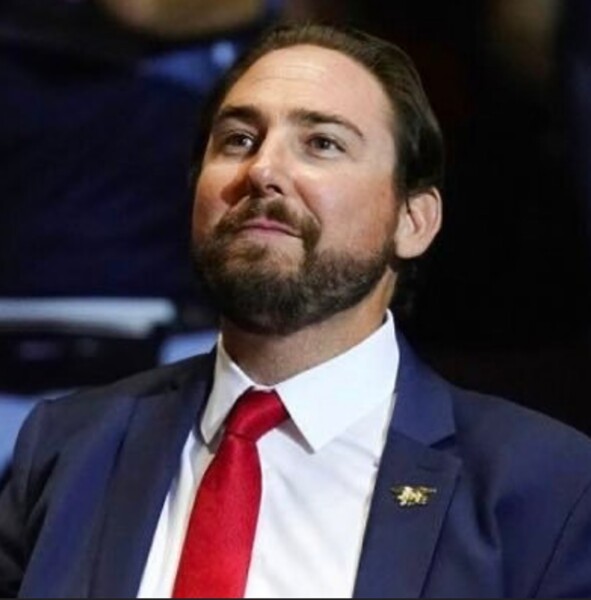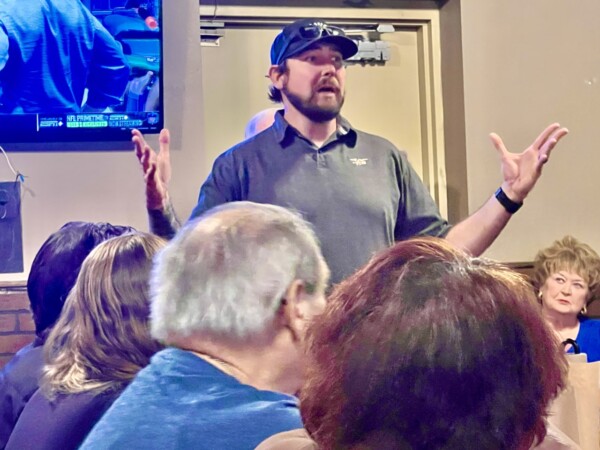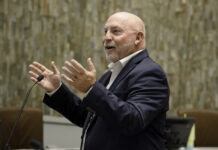
Yet, he says, that training and service serves him well as he attempts to unseat incumbent Democrat Tom O’Halleran in Arizona’s Second Congressional District in the Nov. 8 general election.
“Absolutely,” Crane, 42, said during an interview with InMaricopa before a recent appearance in front of Republican supporters in Maricopa. “This is not a game for weaklings. Politics is a nasty business. If you can’t take criticism, can’t take insults, this probably is not a good place for you to be.
“The military helped prepare me for the mental toughness it takes. In Special Forces, you learn to think outside the box. In this case, if I’m not innovative and creative, I’ll probably get the same results as the people before me have gotten. So, I’m going to try to be innovative and creative. One of the first things they talk about in SEAL training is you’re nothing by yourself. You must build a good team. The military taught me humility, just understanding teamwork. Don’t ever try to think you have all the answers. If you can do that in business or in politics, you stand a much better chance of being successful.”
The week after 9/11, Crane joined the Navy. He went on five war-time deployments, three of them to Iraq with SEAL Team 3, while serving for 13 years. Afterward, the combat veteran became a small-business owner, husband and father.
An Oro Valley resident and native Arizonan, Crane and his wife Jen started Bottle Breacher, a company featured on television’s “Shark Tank,” where they landed a deal with Mark Cuban and Kevin O’Leary. Bottle Breacher employs and gives back to veterans nationwide.
It was fulfilling, Crane said, yet things he was seeing in the U.S. kept gnawing at him, resulting in his run for office.
“I’m just concerned about this country, what I see going on at the border, what I see in our economy, the fact we’ve had an avowed socialist come in arguably in the top four of the last couple of presidential cycles, the fact I see cultural Marxism in the major institutions that we have — from the media, to Big Tech, academia, even now our military. It really concerns me,” Crane said. “I think we’re headed in the wrong way. I’m afraid we, as Americans, have become so passive and complacent that we’ve just kind of checked out, don’t really pay much attention, and because of that, our country’s in kind of a free-fall right now.”

Some Maricopa officials are concerned the new district, which is larger than its predecessor, is too big and the city might not be represented by someone with extensive local knowledge of issues important to its residents. Crane, for example, acknowledged he is not well-versed in the traffic woes on State Route 347.
Arizona’s current congressional delegation is made up of five Democrats and four Republicans, and O’Halleran’s seat is considered among several across the country that are vulnerable and could lead to a change of majority in the U.S. House of Representatives.
It is a challenge managing the vast expanse, Crane said.
“If my wife wasn’t amazing, there’s no way I could run for office,” Crane said. “It seems like we’re in the car all day long. I try to listen to folks, listen to what they want, try and be a representative of the people. One of the best ways to be a good representative of any district is just listen to people and be willing at times to take something onboard that you might not necessarily want to hear.
“Also, hustle. Last night we were in Show Low. Then we drove to Prescott, with the Republican Women of Prescott, and then we hurried down here. Tomorrow, we’re back up in Prescott, then I’ll come back and spend the evening with my family, and then right back up in Yavapai County. You just have to be willing to hustle and understand it’s going to be a hectic pace, and you better be willing to work.”
Crane on the issues
On the recently passed Inflation Reduction Act: I think it’s in line with many of the spending bills the Democrats have proposed in modern days. With a lot of the legislation proposed, it’s almost like the outcome will be the exact opposite of whatever the bill is named. I think it has a lot of the Green New Deal in it. It’s got 87,000 new IRS agents in it, which would double the size of our IRS, which is of concern not only to myself but Americans of every ilk and political party. Tom O’Halleran was asked in an interview why he supported 87,000 IRS agents. He said he supported it because government needs more revenue streams. I don’t think most people believe the government needs more revenue streams. I think most hard-working folks believe the government needs more fiscal responsibility.
On the U.S. southern border: I like to keep things simple when possible. I think the first thing we need to do is go back to Trump-era policies as soon as possible. We need to finish the wall, we need to re-establish with Mexico policies that we had. I think we need to end catch-and-release. What we see coming through the border now is night and day compared with the Trump era.
On a path to citizenship for undocumented immigrants who have been in the U.S. long term: I’m OK with the possibility of having talks, but I think we have to fix the problem first. When you start talking about amnesty and other things politicians have been talking about for a long time before you fix the actual problem, I think it incentivizes people to continue to stream across that southern border. We need to first shore up that border, and after that we can have conversations about how we want to fix our broken immigration system.
On what can be done for homeless Pinal County veterans who may have mental-health issues: Honestly, I’m really cautious about suggesting solutions for this massive problem with the federal government, because I’ve seen firsthand how a lot of what the federal government touches, they screw up. I’ve worked with a lot of veteran nonprofits. I think solutions to a lot of our veterans issues are going to come from the private sector. The VA is doing a good job caring for our veterans, but I’d like to see a lot of solutions to this problem come from the private sector.
This content was first published in the October edition of InMaricopa magazine.





![MHS G.O.A.T. a ‘rookie sleeper’ in NFL draft Arizona Wildcats wide receiver Jacob Cowing speaks to the press after a practice Aug. 11, 2023. [Bryan Mordt]](https://www.inmaricopa.com/wp-content/uploads/2024/04/cowing-overlay-3-218x150.png)



![Maricopa’s ‘TikTok Rizz Party,’ explained One of several flyers for a "TikTok rizz party" is taped to a door in the Maricopa Business Center along Honeycutt Road on April 23, 2024. [Monica D. Spencer]](https://www.inmaricopa.com/wp-content/uploads/2024/04/spencer-042324-tiktok-rizz-party-flyer-web-218x150.jpg)


![Alleged car thief released without charges Phoenix police stop a stolen vehicle on April 20, 2024. [Facebook]](https://www.inmaricopa.com/wp-content/uploads/2024/04/IMG_5040-218x150.jpg)





Thank you for running Shipmate. I know you will help Maricopa. You have my support.
Aye Aye…got my vote, too.